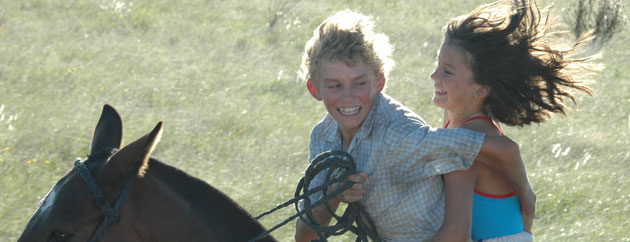
The Last Summer of La Boyita
19 April, 2012Julia Solomonoff‘s latest film is a sweet yet daring look at that awkward no man’s land between the end of childhood and the start of adolescence. The Boyita of the title is a campervan pod which also doubles as a boat according to the brochure, but Jorgelina (Guadalupe Alonso) and her sister Luciana (María Clara Merendino) just use it as a sort of playhouse during school time. Currently they are both experiencing Luciana’s bodily changes and Jorgelina is helping by squeezing her sister’s blackheads for her.
“I’m getting deformed,” she laments. But Jorgelina manages to reassure her with the height of childhood innocence and sincerity. Their closeness starts to hit its limits though, and we witness an early instance of Luciana’s shame as she tries to compel her annoying younger sibling to leave her to use the bathroom in peace.
“Enough with the bidet. You’ll grow moss between your legs.”
“I’d rather grow moss than hair!” teases Jorgelina.
This doesn’t show that she is especially naive or ill-informed, however. She has leafed through graphic gynaecological medical books before and is close enough to her sister to understand the intricacies of what she later euphemistically calls ‘the monthly bill’. She knows it will all happen to her one day but her sister’s obsession with wearing revealing clothes is still a bit of an oddity to her; especially since she is still really too young to have anything to reveal. Although very close, puberty is enough to create a bit of distance between the two sisters, for the moment at least.
So, while Sis chooses to spend the summer at the beach to make the most of the opportunity to meet boys, Jorgelina goes to the countryside to stay with her dad on a ranch. Once settled, she spends a lot of time with a childhood friend, Mario (Nicolás Treise), an awkward farmhand who is nearing a sort of rodeo coming of age event, a horse race to test his rugged manliness.
“A test? To see if he likes it or not?” asks Jorgelina. Her dad reassures her that it doesn’t quite work like that.
At first, Mario avoids Jorgelina, and it almost seems that Jorgelina is coming on to him slightly, but before long we realise that it’s only the confidence of her age manifesting itself. She is still an experienced big fish in the small pond of youth, and has yet to take the blow to confidence which puberty and secondary school tend to deliver, in the form of a breathtaking knock back down to size.
All the young actors in the film are brilliant and can play simple playful joy as well as they do the existential moodiness essential to the plot. The locations too are beautiful, and make Argentina’s vast dry farmland look teeming with life, although I had hoped that the shots of ants eating oranges and praying mantises jerkily sliding themselves up branches would be held for a little longer. This is contrast with the harshness of peasant life and if Mario’s Dad isn’t a real gaucho then they must’ve trained the actor who plays him in a few country ways rather well, because dispatching a cow with such brutal efficiency as he does is not easy to fake.
Despite being a capable horseman and butcher, Mario takes a lot of stick from the slightly older boys, who are already into wine and women, and is devoid of any confidence with which to defend himself. We eventually learn that this is due to a secret medical condition of his, which relegates Jorgelina’s adolescence to a mere subplot, adds a whole new level of intensity to the story and makes the film significantly more than a coming of age saga. The Last Summer of La Boyita is eventually even more tragic than any coming of age story I know, definitely more than Stand By Me and probably even more than The Go Between.
For Jorgelina, there is a telling part at the end where her mum discusses her difficult summer with a friend. She does that patronising thing which parents do when they speak about their kids within earshot as if they are not there. Jorgelina is well aware of this conversation and a has an early teenage strop as a result.
In the end credits we see that La Boyita hasn’t lasted the summer. A tree has fallen and crushed it, and probably along with it, a sizeable chunk of Jorgelina’s childhood. A final literary-styled metaphor in a film which dares to venture into some uncomfortable territory which has at some point been common to us all.
The Last Summer of La Boyita is showing as part of the 1st Argentine Film Festival of London, which will be taking place between April 19th-22nd at the Ritzy Picturehouse in Brixton. See argentinefilmfestival.com for more details.
http://www.youtube.com/watch?v=Z-4_CAMLYQQ
Follow Sounds and Colours: Facebook / Twitter / Instagram / Mixcloud / Soundcloud / Bandcamp
Subscribe to the Sounds and Colours Newsletter for regular updates, news and competitions bringing the best of Latin American culture direct to your Inbox.

